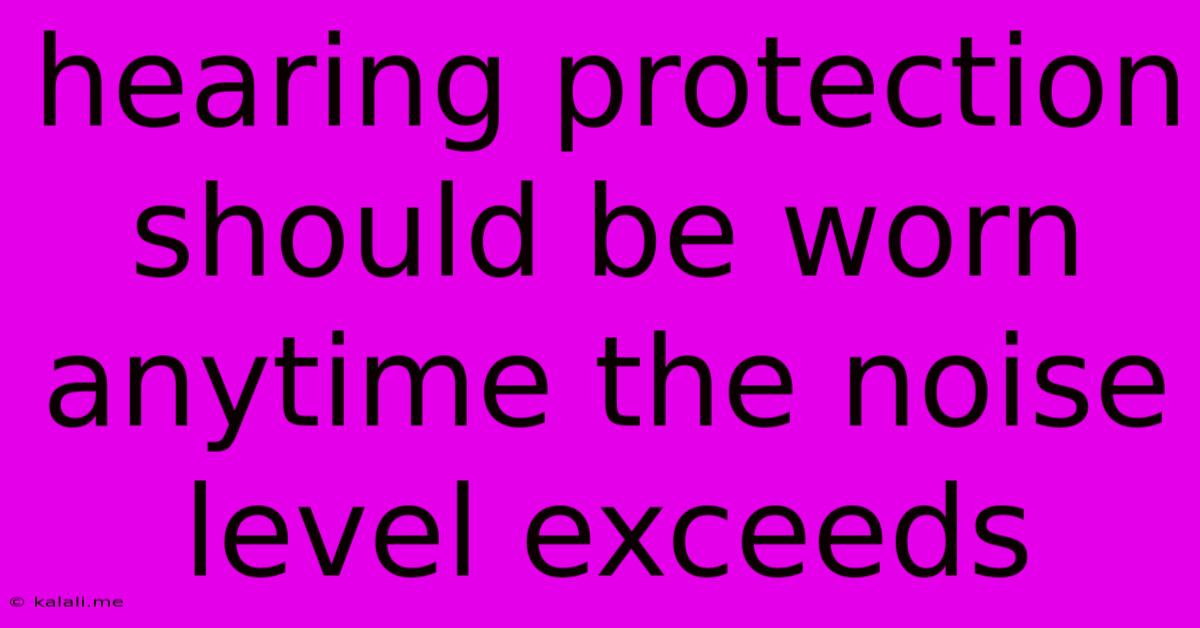Hearing Protection Should Be Worn Anytime The Noise Level Exceeds
Kalali
Jun 15, 2025 · 3 min read

Table of Contents
Hearing Protection: When to Wear It and Why
Hearing loss is preventable, but only if we take the necessary precautions. This article will cover the crucial topic of hearing protection and explain exactly when you should be wearing it: anytime the noise level exceeds safe limits. Ignoring this simple yet vital step can lead to permanent damage, significantly impacting your quality of life.
One of the most common questions we get is, "At what decibel level should I wear hearing protection?" The simple answer is: anytime the noise level is loud enough to require you to shout to be heard. This is a good rule of thumb, but a more precise approach involves understanding decibels and exposure time. Prolonged exposure to sounds above 85 decibels (dBA) can cause hearing loss. This is equivalent to the noise of busy city traffic. Exposure to higher decibel levels for shorter periods can also cause damage.
Understanding Decibel Levels and Hearing Damage
Here's a quick guide to help you understand the dangers of different noise levels:
- Below 70 dBA: Generally safe for prolonged exposure. Think of normal conversation.
- 70-85 dBA: Prolonged exposure can lead to gradual hearing loss. This includes things like a vacuum cleaner or a hairdryer.
- 85-110 dBA: Significant risk of hearing damage with extended exposure. Examples include power tools, lawnmowers, and concerts.
- Above 110 dBA: Immediate risk of hearing damage, even for brief periods. This includes things like jackhammers, firearms, and some industrial machinery.
The longer you're exposed to loud noises, the greater the risk of hearing loss. Even seemingly "harmless" noises, if experienced frequently and for extended periods, can accumulate damage over time. This is often referred to as noise-induced hearing loss (NIHL).
Types of Hearing Protection
Several types of hearing protection are available, each with its own advantages and disadvantages:
- Earmuffs: These offer excellent protection across a wide range of frequencies. They are comfortable for extended wear and provide good overall noise reduction.
- Ear Plugs: These come in various materials (foam, silicone, custom-molded) and are more discreet than earmuffs. They are suitable for various situations, but the effectiveness can vary.
- Custom-Fit Hearing Protection: These are molded to fit your ear perfectly, offering excellent comfort and noise reduction. They are particularly beneficial for those who work in noisy environments regularly.
The best type of hearing protection depends on the specific noise environment and your personal preferences. Consider factors like comfort, noise reduction rating (NRR), and ease of use when choosing your protection.
Beyond Hearing Protection: Protecting Your Hearing
Wearing hearing protection is just one piece of the puzzle. Other steps you can take to protect your hearing include:
- Distance: Move further away from the noise source if possible.
- Time: Limit your exposure time to loud noises.
- Regular Checkups: Schedule regular hearing tests, especially if you work in a noisy environment.
- Noise Reduction at Source: Implement noise-reducing measures in your workplace, such as soundproofing or quieter machinery.
In conclusion, safeguarding your hearing is crucial. Don't underestimate the importance of wearing hearing protection anytime the noise level exceeds safe limits. By understanding decibel levels, choosing the right protection, and employing other preventive measures, you can significantly reduce your risk of noise-induced hearing loss and maintain healthy hearing for years to come. Remember, your hearing is invaluable; protect it!
Latest Posts
Latest Posts
-
The Light Year Is A Unit Of
Jun 15, 2025
-
What Is The Least Common Multiple Of 12 And 40
Jun 15, 2025
-
What Is The Prime Factorization Of 160
Jun 15, 2025
-
Which Reinforcement Schedule Is Most Effective
Jun 15, 2025
-
Which Word Is An Antonym Of Lament
Jun 15, 2025
Related Post
Thank you for visiting our website which covers about Hearing Protection Should Be Worn Anytime The Noise Level Exceeds . We hope the information provided has been useful to you. Feel free to contact us if you have any questions or need further assistance. See you next time and don't miss to bookmark.